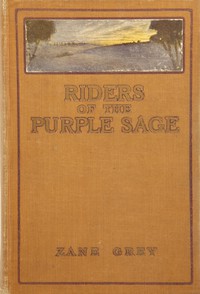The Desert of Wheat, Zane Grey [good non fiction books to read .TXT] 📗

- Author: Zane Grey
Book online «The Desert of Wheat, Zane Grey [good non fiction books to read .TXT] 📗». Author Zane Grey
He buried his face in his hands. "That's the most amazing of all—you—Lenore Anderson, my American girl—asking me not to go to war."
"But, dear, it is not so amazing. It's reasonable. Your peculiar point of view makes it look different. I am no weak, timid, love-sick girl afraid to let you go!… I've given you good, honorable, patriotic reasons for your exemption from draft. Can you see that?"
"Yes. I grant all your claims. I know wheat well enough to tell you that if vastly more wheat-raising is not done the world will starve. That would hold good for the United States in forty years without war."
"Then if you see my point why are you opposed to it?" she asked.
"Because I am Kurt Dorn," he replied, bitterly.
His tone, his gloom made her shiver. It would take all her intelligence and wit and reason to understand him, and vastly more than that to change him. She thought earnestly. This was to be an ordeal profoundly more difficult than the confession of her love. It was indeed a crisis dwarfing the other she had met. She sensed in him a remarkably strange attitude toward this war, compared with that of her brother or other boys she knew who had gone.
"Because you are Kurt Dorn," she said, thoughtfully. "It's in the name, then.… But I think it a pretty name—a good name. Have I not consented to accept it as mine—for life?"
He could not answer that. Blindly he reached out with a shaking hand, to find hers, to hold it close. Lenore felt the tumult in him. She was shocked. A great tenderness, sweet and motherly, flooded over her.
"Dearest, in this dark hour—that was so bright a little while ago—you must not keep anything from me," she replied. "I will be true to you. I will crush my selfish hopes. I will be your mother.… tell me why you must go to war because you are Kurt Dorn."
"My father was German. He hated this country—yours and mine. He plotted with the I.W.W. He hated your father and wanted to destroy him.… Before he died he realized his crime. For so I take the few words he spoke to Jerry. But all the same he was a traitor to my country. I bear his name. I have German in me.… And by God I'm going to pay!"
His deep, passionate tones struck into Lenore's heart. She fought with a rising terror. She was beginning to understand him. How helpless she felt—how she prayed for inspiration—for wisdom!
"Pay!… How?" she asked.
"In the only way possible. I'll see that a Dorn goes to war—who will show his American blood—who will fight and kill—and be killed!"
His passion, then, was more than patriotism. It had its springs in the very core of his being. He had, it seemed, a debt that he must pay. But there was more than this in his grim determination. And Lenore divined that it lay hidden in his bitter reference to his German blood. He hated that—doubted himself because of it. She realized now that to keep him from going to war would be to make him doubt his manhood and eventually to despise himself. No longer could she think of persuading him to stay home. She must forget herself. She knew then that she had the power to keep him and she could use it, but she must not do so. This tragic thing was a matter of his soul. But if he went to war with this bitter obsession, with this wrong motive, this passionate desire to spill blood in him that he hated, he would lose his soul. He must be changed. All her love, all her woman's flashing, subtle thought concentrated on this fact. How strange the choice that had been given her! Not only must she relinquish her hope of keeping him home, but she must perhaps go to desperate ends to send him away with a changed spirit. The moment of decision was agony for her.
"Kurt, this is a terrible hour for both of us," she said, "but, thank Heaven, you have confessed to me. Now I will confess to you."
"Confess?… You?… What nonsense!" he exclaimed. But in his surprise he lifted his head from his hands to look at her.
"When we came in here my mind was made up to make you stay home. Father begged me to do it, and I had my own selfish motive. It was love. Oh, I do love you, Kurt, more than you can dream of!… I justified my resolve. I told you that. But I wanted you. I wanted your love—your presence. I longed for a home with you as husband—master—father to my babies. I dreamed of all. It filled me with terror to think of you going to war. You might be crippled—mangled—murdered.… Oh, my dear, I could not bear the thought!… So I meant to overcome you. I had it all planned. I meant to love you—to beg you—to kiss you—to make you stay—"
"Lenore, what are you saying?" he cried, in shocked amaze.
She flung her arms round his neck. "Oh, I could—I could have kept you!" she answered, low voiced and triumphant. "It fills me with joy.… Tell me I could have kept you—tell me."
"Yes. I've no power to resist you. But I might have hated—"
"Hush!… It's all might have.… I've risen above myself."
"Lenore, you distress me. A little while ago you bewildered me with your sweetness and love.… Now—you look like an angel or a goddess.… Oh, to have your face like this—always with me! Yet it distresses me—so terrible in purpose. What are you about to tell me? I see something—"
"Listen," she broke in. "I meant to make you weak. I implore you now to be strong. You must go to war! But with all my heart and soul I beg you to go with a changed spirit.… You were about to do a terrible thing. You hated the German in you and meant to kill it by violence. You despised the German blood and you meant to spill it. Like a wild man you would





Comments (0)